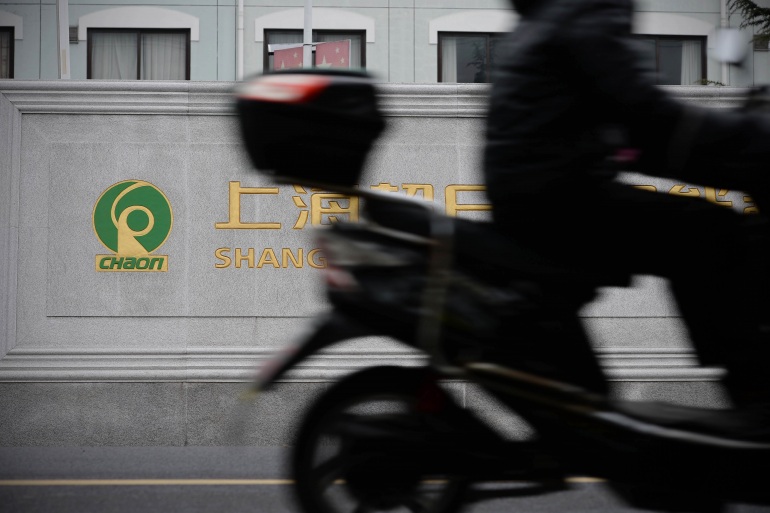Righting China's economy by default

A motorbike rider rides past the gate of the faculties of Chaori Solar Energy Science & Technology Co. in Shanghai on March 8, 2014. (AFP)
China has just experienced its first default in the corporate bond market. China's Shanghai Chaori Solar Energy Science & Technology Co. announced last week that it could not meet its interest payment obligations on a 1 billion yuan corporate bond issued in 2012..
The Chinese bond market has reacted calmly. Many analysts and commentators hail this default as a watershed event in China’s long march to become a fully-fledged market economy. But companies default on their debts all the time around the world, so why is Chaori’s default such a historic event?
The country’s public bond market started trading in the early 1990’s and it has already grown to be the fourth largest globally. Credit rating agency, Standard & Poor’s, estimates China’s corporate debt could hit US$13.8 trillion, surpassing the US as the world’s largest.
Despite the rapid accumulation of debt and the worsening economic situation in China, the country did not experience any defaults until last week. The lack of defaults in China is not just due to the sterling performance of the economy but also to the existence of an implicit policy of support from Chinese state-owned banks, which are the largest buyers of corporate bonds.
Chinese governments -- especially local ones -- have shown a willingness to come to the aid of companies that are under debt distress in order to avoid potential disruptions to the debt market. In fact, Chaori, like many other struggling solar-equipment makers, has been under financial pressure for several years now.
It narrowly avoided a default in early 2013 when the local government stepped in to help the company to roll over debts. The interventionist policy from the government has been under heavy criticism for many years. The visible hands of the government are muddying the water of the corporate bond market, creating a huge amount of moral hazard in the Chinese financial system.
“If the moral hazard in the financial sector is left unchecked, there is a risk it will lead to a widespread under-pricing of risky assets and over investment in non-viable projects that could take on systematic proportions,” said Paul Gruenwald, Standard & Poor’s Asia-Pacific chief economist.
The alternative is for the government to refrain from intervening and allow some risky wealth management products and bonds to fail. That will demonstrate that the products aren’t guaranteed, which then allows for better resource allocation and repricing to better reflect the risk levels.
It was only a month ago that Chinese local governments and big state-owned commercial banks orchestrated the rescue of a failing 3 billion yuan trust product linked to a coal project. Many market analysts and commentators derided the government for the rescue, saying it had missed a golden opportunity to teach investors a lesson in moral hazard.
Shortly after the rescue, Business Spectator interviewed the chairman of the China Construction Bank (CCB), Wang Hongzhang, one of the country’s most powerful bankers, who said failing companies needed to meet certain conditions and standards before they were allowed to default.
It seems Chaori has met those conditions and the Construction Bank of China is one of two major underwriters for Chaori’s debt. The company is part of the struggling solar energy industry that has been suffering from massive over-capacity issues and Beijing has made it clear that it wants to clamp down on aimless expansion of production in sectors like solar panels, steels, cement and shipbuilding.
The fact that the government and banks, including CITIC and CCB, two of the most powerful banks in the country, have chosen to let Chaori default is a strong signal that Beijing is willing to address the problem of moral hazard and end the implicit state guarantee for financially-distressed and commercially-unviable borrowers.
This move will impose more market discipline on lenders and investors who have been blasé about the risks involved in many bonds and financial products due to the implicit state guarantee. Chinese bond market analysts are predicting investors’ flight to high-quality investment products like bank debts and higher funding costs for smaller and medium sized companies.
Many Chinese and foreign analysts regard the move as a positive step in the right direction. Deutsche Bank believes the new policy direction will lead to a healthier corporate bond market and Standard & Poor’s thinks this landmark event will make lenders and investors more disciplined.
However, there are others who think this is the beginning of the unravelling of China’s debt market. Bank of America Merrill Lynch thinks Chaori’s default is China’s Bear Stearns moment.
“We doubt that the financial system in China will experience a liquidity crunch immediately because of this default but we think the chain reaction will probably start. In the US, it took about a year to reach the Lehman stage when the market panicked and the shadow banking froze. We assess that it may take less time in China as the market here is less transparent,” says Andrew Peck from the bank’s global research team.
A previous version of this article incorrectly stated forecasts for China’s corporate debt as US$13.8 billion.















